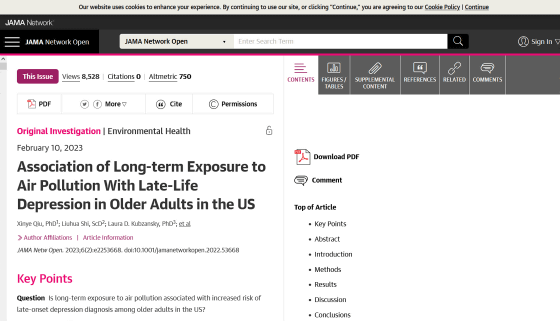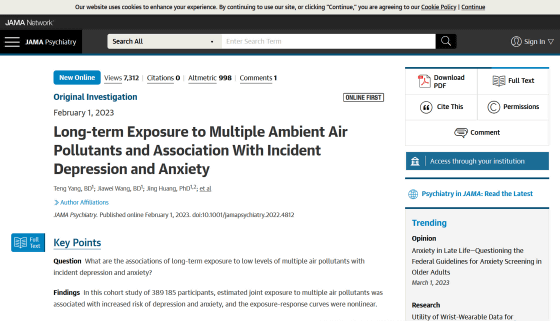Research results that air pollution adversely affects not only lungs but also mental health

Air pollution is known to
Association of Long-term Exposure to Air Pollution With Late-Life Depression in Older Adults in the US | Depressive Disorders | JAMA Network Open | JAMA Network
https://doi.org/10.1001/jamanetworkopen.2022.53668

Air pollution exposure may increase risk of depression in elderly people | News | Harvard TH Chan School of Public Health
https://www.hsph.harvard.edu/news/hsph-in-the-news/air-pollution-exposure-may-increase-risk-of-depression-in-elderly-people/
Air Pollution Isn't Only Bad For Lungs, Say Studies. It's Also Bad For Mental Health : ScienceAlert
https://www.sciencealert.com/air-pollution-isnt-only-bad-for-lungs-say-studies-its-also-bad-for-mental-health
Long-term exposure to air pollution may raise risk of depression later in life, study says - CNN
https://edition.cnn.com/2023/02/10/health/pollution-depression-seniors-wellness
In general, much of the discussion about depression focuses on young people, and depression in older people is relatively neglected. Therefore, the research team of the paper published in the academic journal JAMA Network Open, in order to investigate the effects of air pollution on the mental health of the elderly, 64 years old and over who are registered with Medicare , the public medical insurance system in the United States analyzed data from more than 8.9 million seniors in

According to the data, more than 1.52 million of the 8.9 million people targeted were diagnosed with depression between 2005 and 2016. The research team identified the areas where subscribers lived based on their zip codes and mapped how polluted the air in each area was on a year-by-year basis. In this study, we investigated air pollutants such as PM2.5 emitted from power plants and construction sites, nitrogen dioxide emitted mainly from internal combustion engines of transportation, and ozone derived from power plants and refineries. That's what I'm talking about.
The analysis showed that older people who lived in areas with higher levels of pollution from these air pollutants had a higher risk of developing depression. Also, even at relatively low pollution levels, these three pollutants were associated with an increased risk of late-onset depression. 'A statistically significant association was observed between long-term exposure to high levels of air pollution and an increased risk of depression diagnosis in later life,' the research team said.
'Depression in older adults, like Alzheimer's disease and other neurological conditions, deserves more attention from the general public and researchers,' said Xinye Qiu, Ph.D., lead author of the paper and a researcher at the Harvard School of Public Health. It's a geriatric problem that should be paid for.' ``Since there is no clear threshold here, future societies would prefer to eliminate this pollution or reduce it as much as possible.''

In addition, Qiu et al.'s study found a greater association between exposure to PM2.5 and nitrogen dioxide and depression in socioeconomically disadvantaged groups. This may be due to the social stress of the economic situation and the simultaneous exposure to the poor conditions of air pollution. It was also shown that older people with preexisting heart and respiratory problems were at higher risk of developing depression from exposure to nitrogen dioxide.
Because the majority of the study participants were Caucasian, further research is needed to determine whether similar results are seen in older adults of different races. Also, since this is a study that investigates population-level correlations, we do not know what mechanism air pollution actually relates to the risk of depression.
A paper published around the same time in the academic journal JAMA Psychiatry also found that exposure to air pollution may increase the risk of depression and anxiety, based on a study of 390,000 subjects, mostly living in the United Kingdom. was reported. In this study, even pollution levels below British air quality standards led to an increased risk, and the research team recommends that the government should implement stricter air pollution control measures.
Long-term Exposure to Multiple Ambient Air Pollutants and Association With Incident Depression and Anxiety | Anxiety Disorders | JAMA Psychiatry | JAMA Network
https://doi.org/10.1001/jamapsychiatry.2022.4812

Related Posts:
in Science, Posted by log1h_ik







